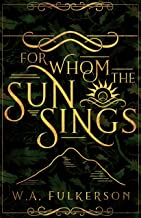Andrius is an absent-minded eleven-year-old boy who lives in a peaceful village filled with secrets upon secrets. One secret he possesses is one even he does not know he possesses: he has an extra way to perceive things that no one else in the community has. Since he doesn’t know he is different when his is growing up (other than he’s constantly called weird), he is not given words for what he perceives. Therefore he must make up his own words for what he is perceiving. The made-up words are a lot of fun. This adds to the mystery puzzle for the reader who must try to figure out what is going on through a child’s inaccurate language.
I loved solving the puzzles presented throughout the story. For Whom the Sun Sings does not begin with “Here’s the place. Here’s the situation. And now the story begins.” Instead, the story begins with Andrius walking down the road singing a song that turns out to be a massive clue.
Beaten and yelled at by his mother, loved by his weak father, Andrius tries to fit in with a village of regimented rules, schedules, rituals, rankings, as well as having marker stones and ropes to guide people along paths. It is difficult to fit in when he is different in ways he cannot articulate. I think he has ADD, for his mind is constantly wandering which lands him in trouble. What he’s good at, reading and making patterns, no one else cares about. What he’s bad at, singing, everyone else cares highly about and he is mocked for his poor performance. He is often rebuked for his inattention when the Prophet is being praised. He lives in anxiety about his constant trouble because the nearly thousand people of his village live by this adage: A severe peace must be kept severely. Disrupting the community leads to harsh punishment.
A severe peace must be kept severely.
Peace here means believing what everyone else believes and doing what everyone else does. This he cannot do because he perceives the world differently. When his extra perception helps him rescue a stranger on the wrong side of the barricade, he hears words he doesn’t know the meaning of. Asking what the strange words mean lands him in trouble. He’s sent to judgement. Before the judgement he thinks will end in his death, something he perceives attracts the Prophet’s attention and makes him a hero.
This suspends judgement. Everyone in the village admires him and his mother stops beating him. The Prophet grants him access to more of the village’s appalling secrets. What’s an eleven-year-old boy to do?
Even though God is mentioned only twice in the book (as in He who must not be named or you’ll be punished) and no scripture is quoted, the story is rich in spiritual lessons. Here’s one from father to son: “There is always a way. … there isn’t a problem in the world without a solution. Maybe you have it, maybe you don’t, but nothing is”— he closed his eyes as he searched for the right words—“ broken beyond repair. Somehow, somewhere everything can be fixed. Sometimes you just aren’t the one who can do it.”
“…there isn’t a problem in the world without a solution. Maybe you have it, maybe you don’t, but nothing is broken beyond repair. Somehow, somewhere everything can be fixed. Sometimes you just aren’t the one who can do it.”
I thought I knew how the book was going to end, but I was only half right. The surprise was as delightful as it was appalling and inspiring. The prose is plain, simple, and clear with only the rare metaphor. However, the entire story is lovely metaphor, though not in an allegorical sense. I found one anachronism that bothered me, but one defect in an entire book is nothing. This is the kind of special book that gives your brain a workout. I would love to see more books like this.
I highly recommend this book to fourteen and up readers. Precocious tweens who are capable of putting together literary puzzles might also love the story. I think the book is better for older readers, though, because some of the themes are grim and require some knowledge of history to understand how real the events in the book felt.
Ratings:
Heat: None
Cursing: None
Violence: Two incidents where people are killed. A few incidents of bullying, and one where Andrius is beaten badly by his mother. One scene of the villagers beating Andrius.
For Whom the Sun Sings is available on Amazon
Disclaimer: I received a free copy of this book with a request for an unbiased review.
Lelia Rose Foreman has raised and released five children. Everyone survived. She also homeschooled fourteen years with similar results. You can find her Christian science-fiction, A Shattered World in English or Spanish. She writes science fantasy adventure, Tales from Talifar with her oldest son, a video game artist, under the name Rose Foreman. You can contact Josh Foreman at breathoflifedev.com



 SWORD IN THE STARS by Wayne Thomas Batson
SWORD IN THE STARS by Wayne Thomas Batson
Leave a Reply